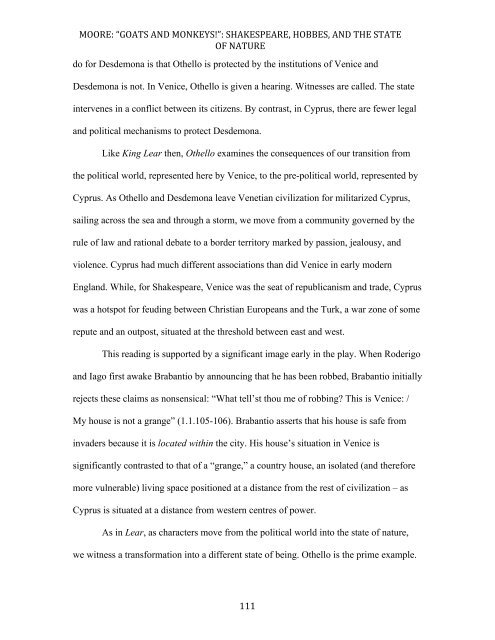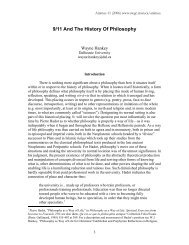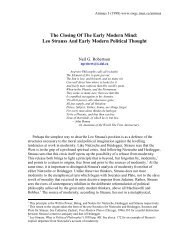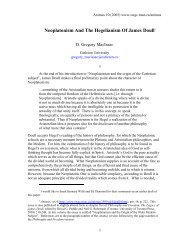âgoats and monkeys!â: shakespeare, hobbes, and the state of nature
âgoats and monkeys!â: shakespeare, hobbes, and the state of nature
âgoats and monkeys!â: shakespeare, hobbes, and the state of nature
You also want an ePaper? Increase the reach of your titles
YUMPU automatically turns print PDFs into web optimized ePapers that Google loves.
MOORE: “GOATS AND MONKEYS!”: SHAKESPEARE, HOBBES, AND THE STATE <br />
OF NATURE <br />
do for Desdemona is that O<strong>the</strong>llo is protected by <strong>the</strong> institutions <strong>of</strong> Venice <strong>and</strong><br />
Desdemona is not. In Venice, O<strong>the</strong>llo is given a hearing. Witnesses are called. The <strong>state</strong><br />
intervenes in a conflict between its citizens. By contrast, in Cyprus, <strong>the</strong>re are fewer legal<br />
<strong>and</strong> political mechanisms to protect Desdemona.<br />
Like King Lear <strong>the</strong>n, O<strong>the</strong>llo examines <strong>the</strong> consequences <strong>of</strong> our transition from<br />
<strong>the</strong> political world, represented here by Venice, to <strong>the</strong> pre-political world, represented by<br />
Cyprus. As O<strong>the</strong>llo <strong>and</strong> Desdemona leave Venetian civilization for militarized Cyprus,<br />
sailing across <strong>the</strong> sea <strong>and</strong> through a storm, we move from a community governed by <strong>the</strong><br />
rule <strong>of</strong> law <strong>and</strong> rational debate to a border territory marked by passion, jealousy, <strong>and</strong><br />
violence. Cyprus had much different associations than did Venice in early modern<br />
Engl<strong>and</strong>. While, for Shakespeare, Venice was <strong>the</strong> seat <strong>of</strong> republicanism <strong>and</strong> trade, Cyprus<br />
was a hotspot for feuding between Christian Europeans <strong>and</strong> <strong>the</strong> Turk, a war zone <strong>of</strong> some<br />
repute <strong>and</strong> an outpost, situated at <strong>the</strong> threshold between east <strong>and</strong> west.<br />
This reading is supported by a significant image early in <strong>the</strong> play. When Roderigo<br />
<strong>and</strong> Iago first awake Brabantio by announcing that he has been robbed, Brabantio initially<br />
rejects <strong>the</strong>se claims as nonsensical: “What tell’st thou me <strong>of</strong> robbing This is Venice: /<br />
My house is not a grange” (1.1.105-106). Brabantio asserts that his house is safe from<br />
invaders because it is located within <strong>the</strong> city. His house’s situation in Venice is<br />
significantly contrasted to that <strong>of</strong> a “grange,” a country house, an isolated (<strong>and</strong> <strong>the</strong>refore<br />
more vulnerable) living space positioned at a distance from <strong>the</strong> rest <strong>of</strong> civilization – as<br />
Cyprus is situated at a distance from western centres <strong>of</strong> power.<br />
As in Lear, as characters move from <strong>the</strong> political world into <strong>the</strong> <strong>state</strong> <strong>of</strong> <strong>nature</strong>,<br />
we witness a transformation into a different <strong>state</strong> <strong>of</strong> being. O<strong>the</strong>llo is <strong>the</strong> prime example.<br />
111
















